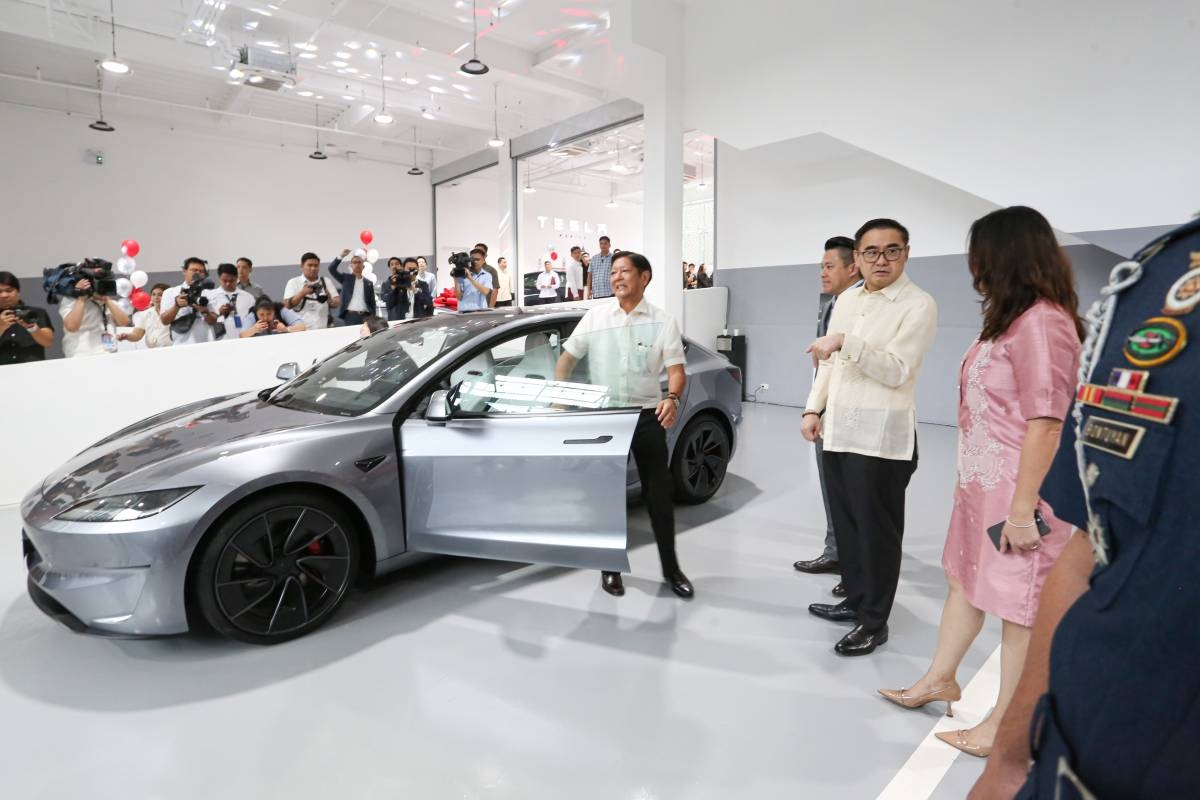Marcos leads launch of Tesla Motors PH
(UPDATE) PRESIDENT Ferdinand Marcos Jr. on Monday led the launching of Tesla Motors Philippines Inc., the electric vehicle company's fourth market in Southeast Asia. Marcos hailed Tesla's decision to invest in the country as "a recognition of our nation's potential, underpinned by forward-thinking policies and a collective determination to innovate." "As Tesla lays a groundwork, and as we invest in infrastructure and implement policies supporting the industry, competition will grow. Then, what may seem as aspirational today — half of the vehicles in our streets as EVs (electric vehicles) — will become attainable tomorrow," he said. Apart from helping environmental sustainability, Tesla is also empowering the local workforce, the president said. "With plans to expand further, Tesla is building a generation of Filipinos equipped to lead in the global shift towards sustainable technologies such as this," Marcos said. He said he also sees Tesla putting up shop in the Philippines as proof of his administration's resolve to make the country's transportation sector more environment-friendly with high-tech cars on the road. "The government understands that transitioning to electric vehicles is a complex journey, one that requires vision and a great deal of strong and committed concrete action to make it practical, inclusive, and impactful for every Filipino. And this is why we have adopted and pursued strategic measures that reflect our commitment to enhancing sustainable transportation while meeting the needs of our communities," he said. He said his administration has adopted policies and passed laws that entice Filipinos to make the shift to EVs. These include the Tax Reform for Acceleration and Inclusion or Train Act, which removes the excise taxes on battery electric vehicles, and the Electric Vehicle Industry Development Act (Evida), which offers duty-free importation for charging stations, lower user fees for EV owners and prioritized registration and traffic privileges created more competitive, traditional options. Additional measures further cement the laws and strengthen the government's commitment to clean energy, the president said. The measures include the Comprehensive Roadmap for the Electric Vehicle Industry, which aims to achieve a 50-percent electric vehicles market share in the Philippines by 2040, and the issuance of Executive Order 62, which aims to reduce tariff rates on pure electric or hybrid four-wheel and motorcycle EVs to zero until 2028.

(UPDATE) PRESIDENT Ferdinand Marcos Jr. on Monday led the launching of Tesla Motors Philippines Inc., the electric vehicle company's fourth market in Southeast Asia.
Marcos hailed Tesla's decision to invest in the country as "a recognition of our nation's potential, underpinned by forward-thinking policies and a collective determination to innovate."
"As Tesla lays a groundwork, and as we invest in infrastructure and implement policies supporting the industry, competition will grow. Then, what may seem as aspirational today — half of the vehicles in our streets as EVs (electric vehicles) — will become attainable tomorrow," he said.
Apart from helping environmental sustainability, Tesla is also empowering the local workforce, the president said.
"With plans to expand further, Tesla is building a generation of Filipinos equipped to lead in the global shift towards sustainable technologies such as this," Marcos said.
He said he also sees Tesla putting up shop in the Philippines as proof of his administration's resolve to make the country's transportation sector more environment-friendly with high-tech cars on the road.
"The government understands that transitioning to electric vehicles is a complex journey, one that requires vision and a great deal of strong and committed concrete action to make it practical, inclusive, and impactful for every Filipino. And this is why we have adopted and pursued strategic measures that reflect our commitment to enhancing sustainable transportation while meeting the needs of our communities," he said.
He said his administration has adopted policies and passed laws that entice Filipinos to make the shift to EVs.
These include the Tax Reform for Acceleration and Inclusion or Train Act, which removes the excise taxes on battery electric vehicles, and the Electric Vehicle Industry Development Act (Evida), which offers duty-free importation for charging stations, lower user fees for EV owners and prioritized registration and traffic privileges created more competitive, traditional options.
Additional measures further cement the laws and strengthen the government's commitment to clean energy, the president said.
The measures include the Comprehensive Roadmap for the Electric Vehicle Industry, which aims to achieve a 50-percent electric vehicles market share in the Philippines by 2040, and the issuance of Executive Order 62, which aims to reduce tariff rates on pure electric or hybrid four-wheel and motorcycle EVs to zero until 2028.


















